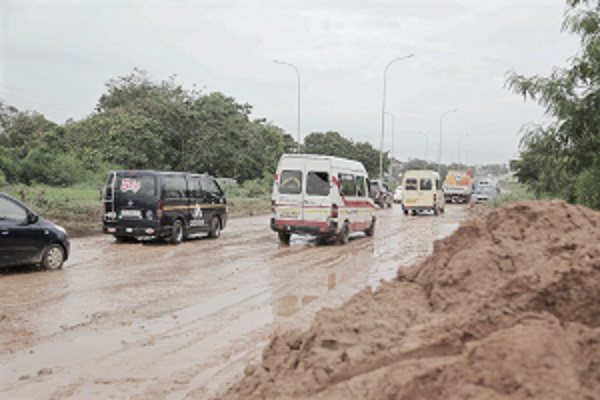Another mudslide on the Kasoa-Accra highway rendered a part of the stretch impassable after Friday’s torrential rains.
Silt and muddy pools of water covered most parts of the road, which is about a kilometre away from the Kasoa tollbooth, making it extremely difficult for drivers on the stretch.
It resulted in a gridlock which forced some motorists to drive on the opposite side of the dual carriageway leading to Kasoa.
Some drivers who had prior knowledge of the situation diverted to the relatively longer Kokrobite route that leads to the Kasoa old barrier.
The situation, however, presented an opportunity for some unemployed youth to desilt the road for money from drivers and other commuters.
The situation, which is not new, is as a result of the massive development ongoing in the area that continues to strip the land of its vegetative cover.
Experts say the soil in the area is loose, making the area vulnerable to erosion.
In the absence of proper drainage in the settlement, running water and mud from the hills create deep gullies and end up on the road.
The situation also poses a major threat to houses at MacCarthy Hill and the edges, as they risk being destroyed by a torrential downpour in the area.
Quarrying and sand-winning activities continue to leave gaping holes in the hill overlooking the Weija Dam, from which volumes of water wash down sediments onto the road.
A section of the hill which is a major source of gravel for the construction of the Mallam-Kasoa road, has, over the years, been taken over by sand winners and people who make a living at a nearby quarry.
In June 2013, loose parts of the hill fell and blocked the Kasoa-Weija portion of the road after a downpour, resulting in a traffic jam for hours.
Apart from the houses competing for space, churches have also sprung up at the place.
Some landslides countrywide
On June 15,1933, a landslide occurred on a section of the Akwapim-Togo Ranges, where Have in the Volta Region is located but no major disaster was recorded.
The entire Afram Plains District and part of the Kwahu South District were cut off from the rest of the country on March 5, 2005, following a landslide at Kam, a village near Pitiku Junction in the Eastern Region following a downpour. The first landslide in the area occurred in 1972.
On June 20, 2010, a downpour triggered a landslide on the Peduase-Water Works road, a stretch of the Pantang-Mamfe dual carriageway in the Eastern Region.
The landslide occurred close to a two-storey building on the edge of a rocky mountain, blocking part of the road.
Then on October 6, 2010, a landslide occurred during a downpour at Adukrom-Yensi in the Eastern Region, killing three people and destroying many properties.
On October 25, 2012, 20 acres of cocoa farms were destroyed at Wassa Asikuma and Wassa Nkran in the Prestea/Huni Valley District in the Western Region, following heavy rainfall which affected 60 cocoa farmers.
Source: Daily Graphic

